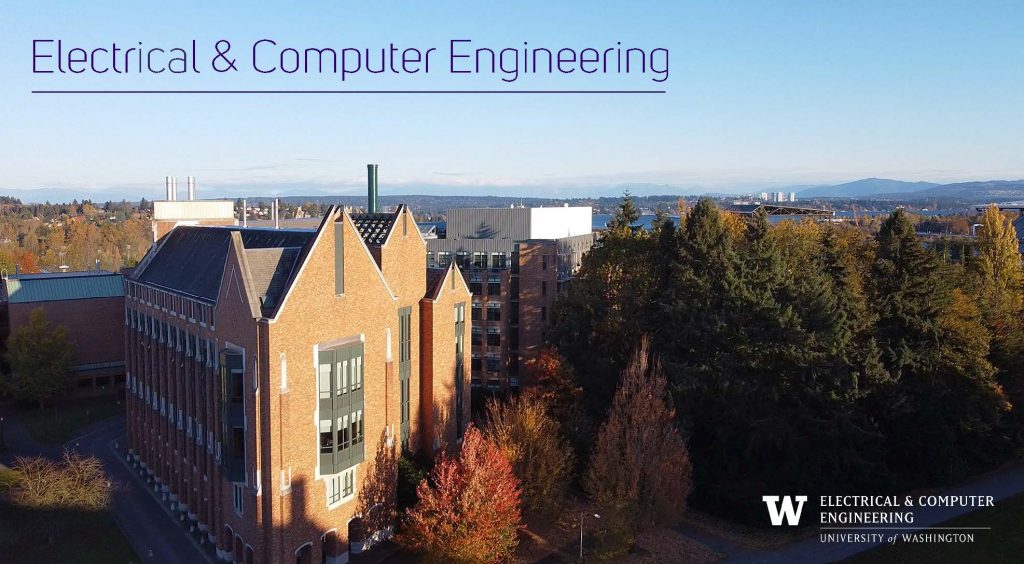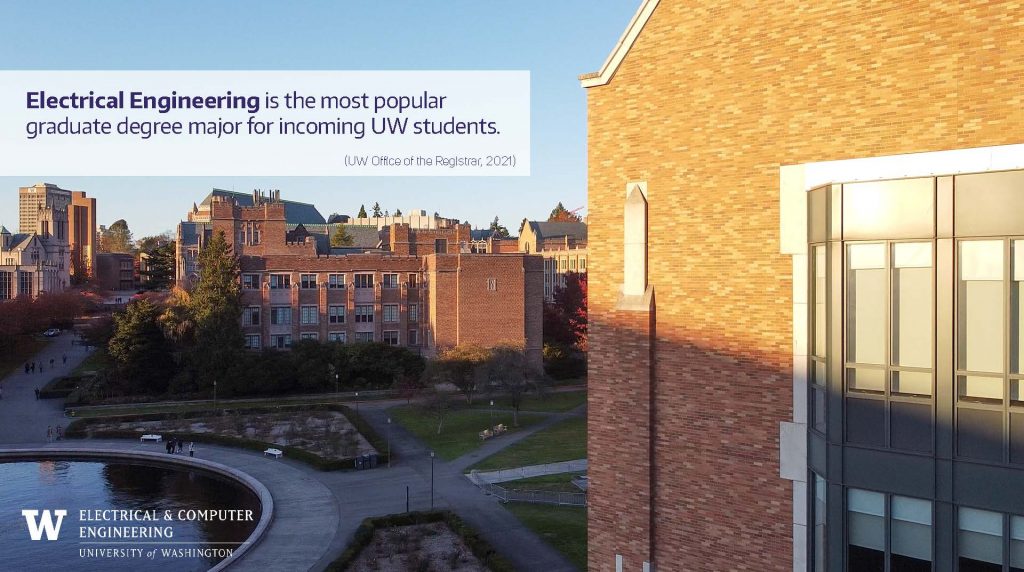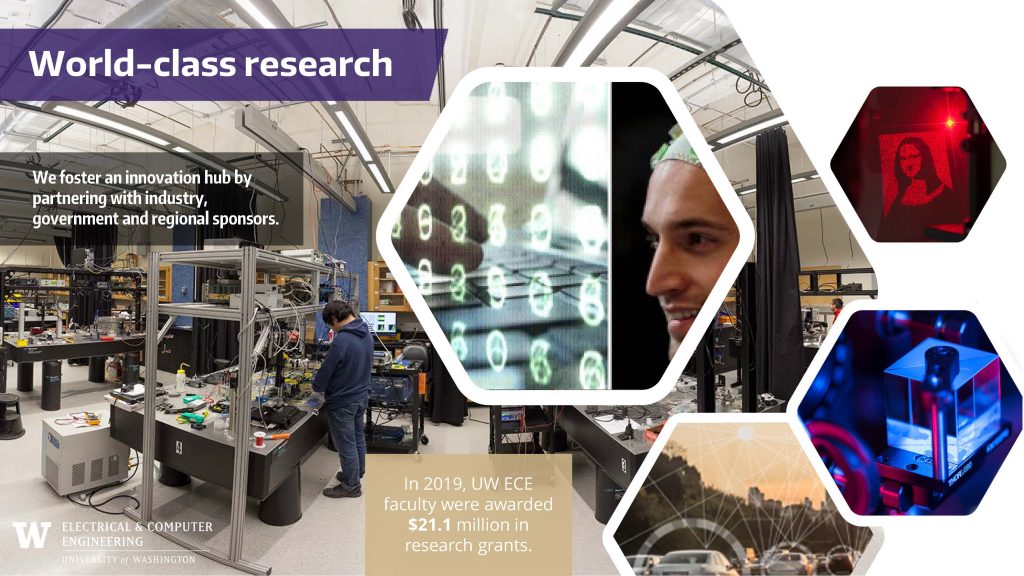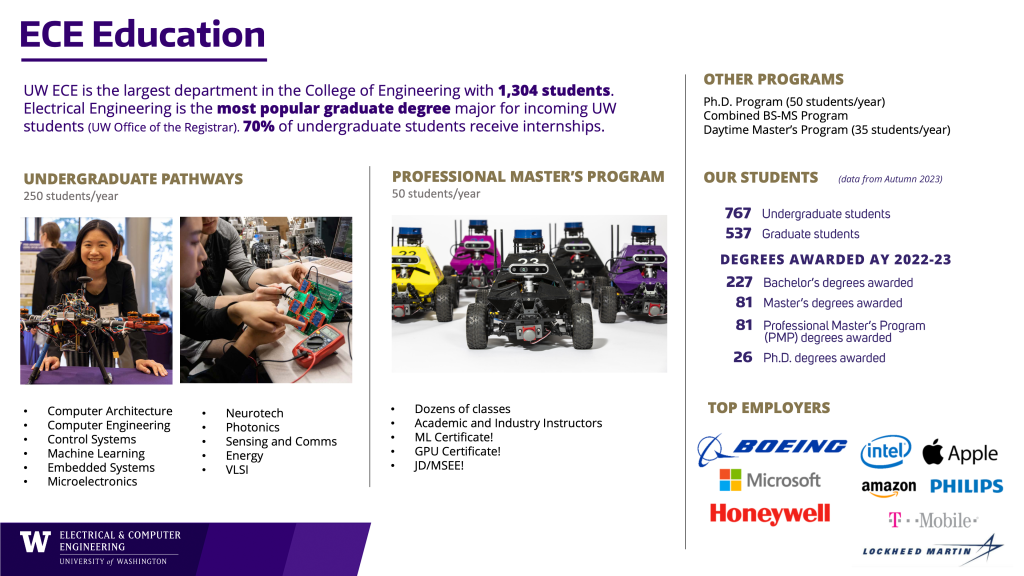Our Mission
At UW ECE, we cultivate innovation and inspire through high-impact research. We educate and develop tomorrow’s leaders to solve the world’s most pressing challenges.
UW ECE’s position as a top-ranked electrical and computer engineering department provides our faculty and student body with a vibrant learning culture. Students receive a robust education through a strong technical foundation, group project work and hands-on research opportunities. Our faculty work in dynamic research areas collaborating with academia, industry and government institutions.
UW ECE continues to lead in cutting-edge science and technology while advancing socially-responsible innovation. Our innovation ecosystem is critical in promoting an entrepreneurial mindset in our teaching, and is strengthened through diverse partnerships that address complex global challenges in health, energy, technology and the environment.
- We are committed to merit-driven diversity for broadening participation in STEM.
- We provide our students with a strong technical foundation, refined communication skills and group project work.
- We hire and retain exceptional faculty to develop an innovation ecosystem.
- We provide electrical and computer hardware fundamentals and promote an entrepreneurial mindset.
- We foster an innovation hub by partnering with industry, government and regional sponsors.
Our Facts
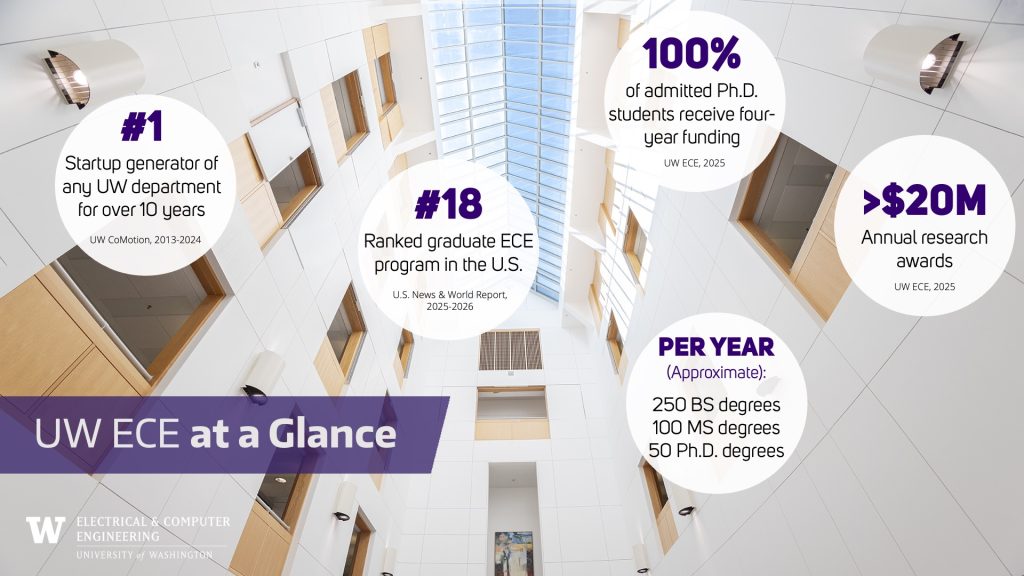
We are committed to merit-driven diversity for broadening participation in STEM.
We value diversity in both our faculty and student base, supporting broader participation by all groups in STEM.
Minorities make up one-fourth of our undergraduate and graduate school classes.
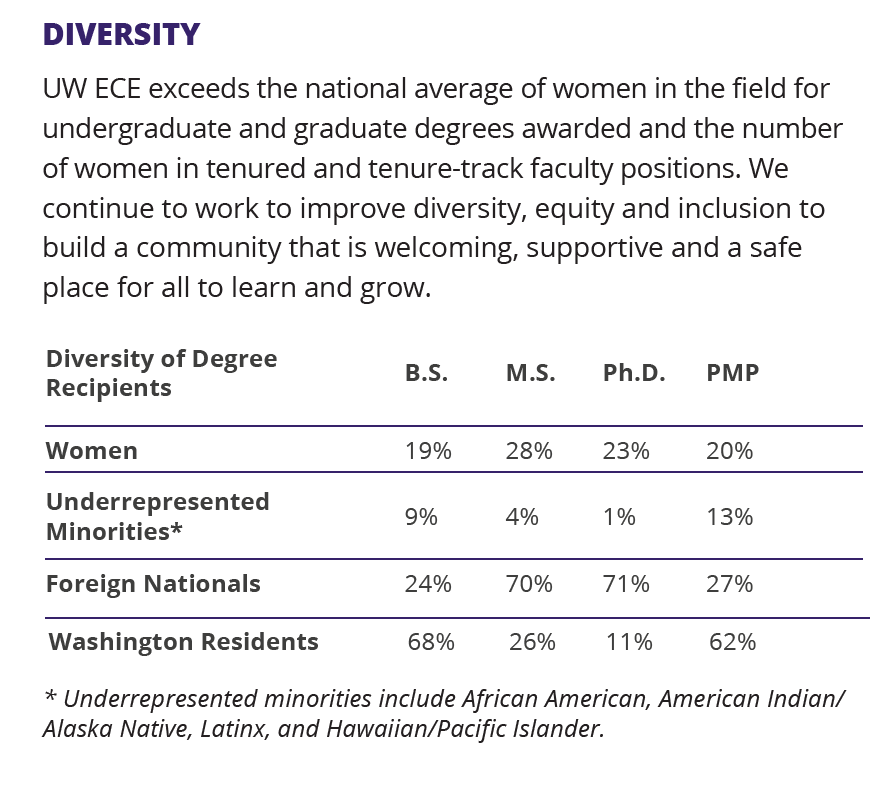
We exceed the national average of women in electrical engineering
Percentage of undergraduate degrees awarded to women:
National: 13% | UW ECE: 19%
Percentage of master’s degrees awarded to women:
National: 23% | UW ECE: 24%
Percentage of Ph.D. degrees awarded to women:
National: 14.7% | UW ECE: 16.7%
Percentage of tenured and tenure-track women faculty:
National: 19.6% | UW ECE: 30.5%
We provide our students with a strong technical foundation, refined communication skills and group project work.
We provide 13 major concentrations areas and new BSECE degree pathways, launched in autumn 2022.
The Department also offers an Engineering INnovation and Entrepreneurshp (ENGINE) capstone program to engage our students with industry partners.
We foster a thriving culture of innovation.
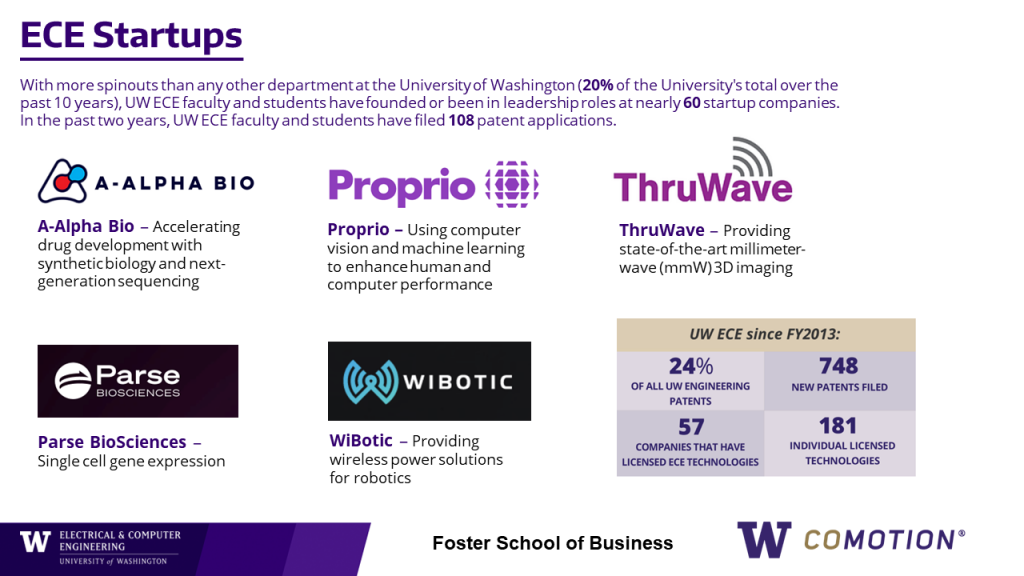
Our students are collaborators, innovators and leaders. With more spinouts than any other department at the UW, UW ECE faculty and students have founded or been in leadership roles at more than 60 startup companies, including:
- A-Alpha Bio – Accelerating drug development with synthetic biology and next-generation sequencing
- Jeeva Wireless – Reimagining connectivity with low-power backscatter technology
- MicrobiomX – Providing rapid, personalized restorative gut therapy through microbiota transplants
- Olis Robotics – Making robots smarter through progressive autonomy
- OneRadio – Changing the way we access the radio-frequency spectrum.
- Parse Biosciences – Providing scalable single cell RNA-sequencing solutions
- Proprio – Using computer vision and machine learning to enhance human and computer performance
- Tunoptix, Inc. – Tunable metasurface optics for machine vision and AR/VR applications
- ThruWave – Providing state-of-the-art millimeter-wave (mmW) 3D imagers.
- WiBotic – Providing wireless power solutions for robotics
We hire and retain exceptional faculty to develop an innovation ecosystem.

Each year, the faculty base continues to grow. Seven new faculty joined the department for the 2022-23 Academic Year, two new faculty joined for the 2023-2024 Academic Year, and six new faculty members were hired for the 2024-2025 Academic Year. UW ECE faculty are frequently honored for excellence in research, innovation, and teaching.
Our research areas are diverse:
Biosystems – Synthetic biology, neural engineering, medical devices, mobile health
Computing & Networking – Computer engineering and architecture, VLSI, embedded systems, wireless communication, cybersecurity
Data Sciences – Machine learning, statistical signal processing, speech and natural language processing, computer vision and image processing
Electronic, Photonic, Integrated & Quantum Systems (EPIQS) – Nanoscale materials and structure, MEMs, quantum
Power & Energy Systems – Smart Grid, integration of renewable energy sources, grid security, power system economics, energy harvesting
Robotics & Controls – Surgical biorobotics, smart cities, haptics, network control systems
We provide electrical and computer hardware fundamentals and promote an entrepreneurial mindset.
In 2019, we saw:
59 new innovations
83 new patent applications
22 patent applications issued
5 new startup companies
Our faculty have been recognized with several prestigious awards and fellowships, including the Fulbright Scholarship, the Microsoft Collaborator Award, Department of Defense MURI Grants and many more. They hold expertise in a range of areas, including engineering hardware and software.
We foster an innovation hub by partnering with industry, government and regional sponsors.
We have dozens of partnerships across industry, government and nonprofit organizations.
66% of our funding comes from federal government grants and awards. The rest of funding comes from local government, industry support, nonprofit foundations, private support and international grants.
In FY22, UW ECE received $25 million in research awards.
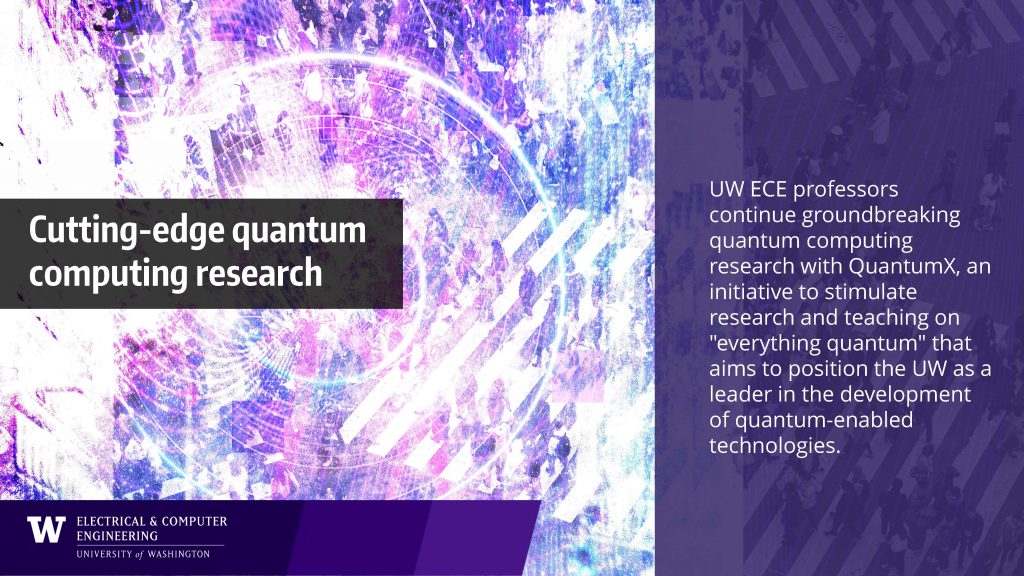
Centers and Labs
UW ECE faculty lead or participate in interdisciplinary research centers across campus, and direct laboratories at the cutting-edge of the field.
• AMP Lab – Amplifying Movement and Performance
• The UW Biofabrication Center (BIOFAB)
• Clean Energy Institute (CEI)
• Center for Neurotechnology (CNT)
• UW ECE Center on Satellite Multimedia and Connected Vehicles (CMMB Vision)
• eScience Institute
• Institute for Nano-Engineered Systems (NanoES)
• Molecular Engineering and Sciences Institute (MolES)
• Northwest Quantum Nexus (NQN)
• UW QuantumX Initiative
• U.S. Dept. of Energy PNW National Lab (PNNL)
State-of-the-Art Facilities
Makerspaces for students to work on rapid prototyping and experimentation.
Washington Nanofabrication Facility (WNF), led by ECE professor Karl Böhringer, provides micro and nanotechnology services.
CoMotion, UW’s collaborative innovation hub, helps faculty and students take ideas from lab to market.
Our History

The UW Impact

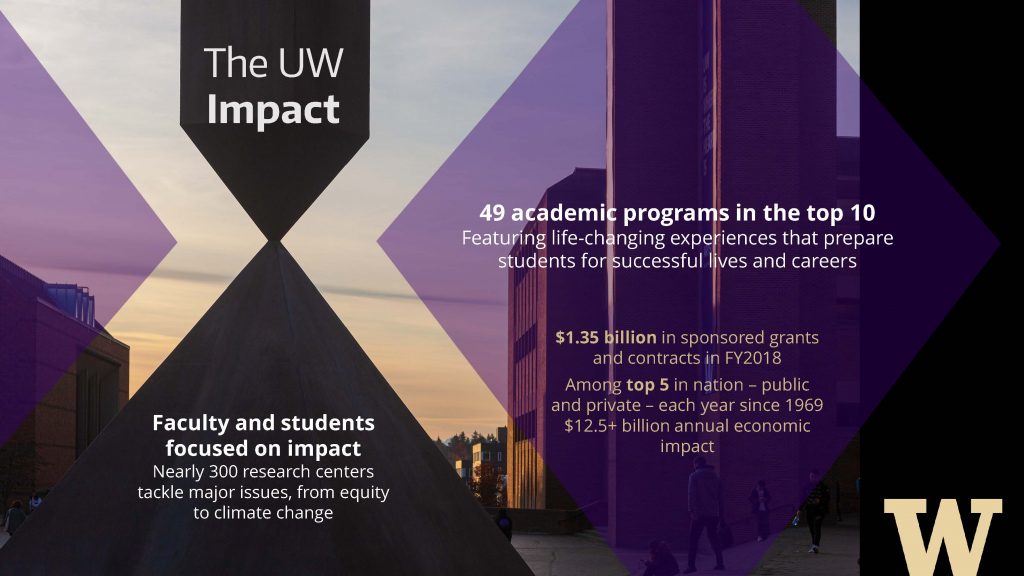
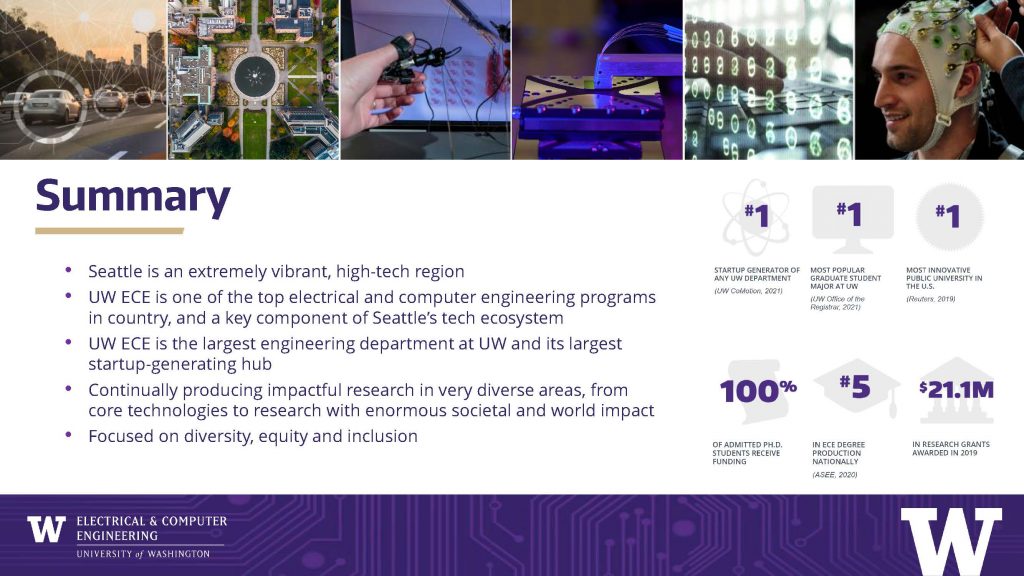
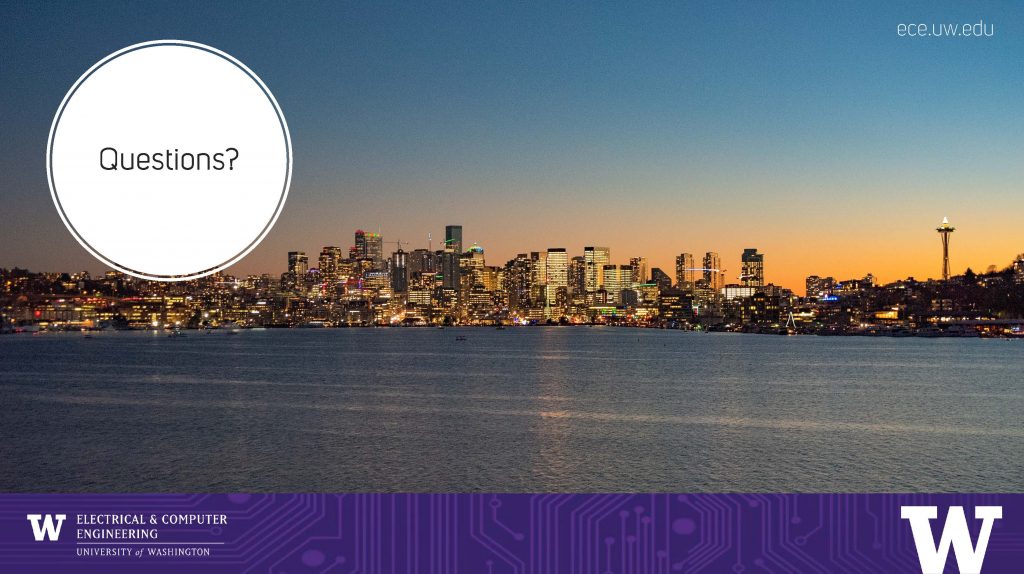
Questions? Please contact us at pr@ece.uw.edu
To see additional information about UW ECE, please view our 2025 Fact Sheet.


